Ever thought a vegetarian diet could help you lose weight? Recent studies show it might. They found a link between eating plants and lower disease risks. Now, let’s see how a smart vegetarian diet can help you manage your weight and improve your health.
Experts say not all vegetarian diets are good. Some, full of processed foods, can harm your health. But, well-planned vegetarian diets can help you lose weight and improve your heart health. Choosing a vegetarian lifestyle is good for you and the planet too.
Understanding the Vegetarian Diet Basics
A vegetarian diet focuses on plant-based foods and excludes meat and fish. Learning about this diet can help you lose weight effectively. It comes in different types, each meeting different needs and preferences. Knowing these variations helps you create a meal plan that suits your goals.
Definition of a Vegetarian Diet
A vegetarian diet doesn’t include meat or fish. People following this diet eat a lot of fruits, vegetables, grains, legumes, and nuts. It’s a healthy way to eat, making it popular for those who want to lose weight and feel better.
Types of Vegetarian Diets
There are many types of vegetarian diets, each with its own features:
- Lacto-vegetarian: Includes dairy products but excludes eggs and meat.
- Ovo-vegetarian: Includes eggs but excludes dairy and meat.
- Lacto-ovo vegetarian: Includes both dairy and eggs but excludes meat.
- Vegan: Excludes all animal products, focusing on plant-based foods.
This variety lets you pick a diet that fits your health goals and lifestyle.
Key Nutrients to Consider
When on a vegetarian diet for weight loss, watch certain nutrients. This ensures you get all the nutrients you need. Here are some important ones:
| Nutrient | Importance | Vegetarian Sources |
|---|---|---|
| Protein | Essential for muscle maintenance and repair | Legumes, tofu, tempeh, nuts |
| Iron | Crucial for energy levels and oxygen transport | Spinach, lentils, quinoa, fortified cereals |
| Calcium | Important for bone health | Dairy products, fortified plant milks, leafy greens |
| Vitamin B12 | Necessary for nerve function and energy production | Fortified cereals, nutritional yeast, dairy |
| Omega-3 Fatty Acids | Supports heart health | Flaxseeds, chia seeds, walnuts, algae supplements |
Monitoring these nutrients helps with weight loss and boosts your health and energy.
The Science Behind Weight Loss
Understanding how weight loss works is key, even with vegetarian diets. It starts with knowing you need to burn more calories than you eat. This can be done through diet changes, exercise, or a mix of both.
How Weight Loss Works
Weight loss is all about creating a caloric deficit. When you burn more energy than you take in, your body uses fat for fuel. Many find that eating vegetarian helps with this, as plant-based foods tend to have fewer calories.
Role of Caloric Deficit
Creating a caloric deficit is easier with good meal planning. Vegetarian weight loss recipes add flavor and keep calories low. They also help keep your energy up, making it easier to stay active.
Importance of Macronutrients
It’s important to balance your macronutrients: carbs, proteins, and fats. Each one does something different in your body. For example, proteins help fix tissues, and fats keep hormones balanced. Eating a balanced vegetarian diet helps manage weight and stay healthy.
Benefits of a Vegetarian Diet for Weight Loss
Switching to a vegetarian diet can bring many benefits for weight loss. It helps you eat fewer calories and improves your health. Let’s look at some of these benefits.
Lower Caloric Intake
A vegetarian diet is full of foods like fruits, veggies, and whole grains. These foods are low in calories but packed with vitamins and minerals. Eating these foods lets you have bigger meals without going over your calorie limit. This makes it easier to lose weight.
High Fiber Content
Plant-based foods are known for their high fiber. Fiber keeps you full and helps with digestion. Adding fiber-rich foods to your diet helps you eat less. It’s a key part of losing weight on a vegan diet, as it helps control hunger.
Reduced Risk of Chronic Diseases
Eating a vegetarian diet can lower your risk of heart disease and diabetes. These diseases can be made worse by being overweight. By focusing on plant-based foods, you’re not just losing weight. You’re also improving your health and well-being.
| Benefit | Description |
|---|---|
| Lower Caloric Intake | Focus on fruits, vegetables, and whole grains to reduce calorie consumption. |
| High Fiber Content | Enhances satiety and promotes healthy digestion, helping control hunger. |
| Reduced Risk of Chronic Diseases | Supports long-term health and reduces the likelihood of diseases related to excess weight. |
Common Misconceptions
Many people think a vegetarian diet for weight loss is hard. They might worry about not getting enough nutrients. It’s important to know the truth about vegetarian nutrition for slimming.
Protein Concerns
Some think a meatless diet means you’ll miss out on protein. But, this isn’t true. You can get enough protein from foods like legumes, tofu, tempeh, and dairy. Vegetarian weight loss recipes can help you stay full and meet your protein needs.
Nutritional Deficiencies
People worry about not getting all the nutrients they need. While it’s true that some nutrients, like vitamin B12 and iron, are harder to get, it’s doable. Eating a variety of foods and using fortified products can help. This way, you can stay healthy and keep your energy up while losing weight.
Sustainability and Environmental Impact
Being vegetarian is good for you and the planet. It reduces your carbon footprint and supports sustainability. Many people choose a vegetarian diet because it’s better for the environment. Plus, you get to enjoy tasty vegetarian weight loss recipes.

| Misconception | Reality |
|---|---|
| Insufficient Protein | Sufficient protein can be obtained through legumes, tofu, and dairy. |
| Nutritional Deficiencies | Careful meal planning can prevent deficiencies in key nutrients. |
| Lack of Sustainability | Vegetarian diets significantly lower carbon footprint compared to meat-based diets. |
Popular Vegetarian Weight Loss Plans
Choosing the right vegetarian meal plan can make a big difference in your health journey. Many popular diets focus on whole foods and tasty flavors, helping you lose weight. Here are some top plans to think about:
Mediterranean Diet
The Mediterranean diet is all about eating whole foods like fruits, veggies, and whole grains. It also includes healthy fats from olive oil and a bit of fish. This diet is great for losing weight and improving heart health. It also reduces inflammation. You can find many tasty vegetarian recipes inspired by this diet.
Flexitarian Approach
The Flexitarian diet is mostly plant-based but allows some meat. It’s a flexible way to start eating more vegetarian. By eating more legumes, fruits, and veggies, you can make delicious vegetarian meals that you’ll love.
Whole Foods Plant-Based Diet
The Whole Foods Plant-Based (WFPB) diet focuses on unprocessed plant foods and avoids processed foods. It’s full of nutrients and fiber, helping you lose weight and feel better. Cooking with whole foods can lead to creative and satisfying vegetarian meals.
| Diet Type | Main Focus | Weight Loss Benefits |
|---|---|---|
| Mediterranean Diet | Whole foods, healthy fats, moderate fish | Heart health, reduced inflammation |
| Flexitarian Approach | Plant-based with occasional meat | Greater dietary flexibility |
| Whole Foods Plant-Based Diet | Unprocessed plant foods | High in nutrients and fiber |
These vegetarian weight loss plans offer a tasty journey to better health. Explore the variety of plant-based eating to find meals that excite your taste buds and support your health.
Essential Foods for Weight Loss
Choosing the right foods is key when you’re on a vegetarian diet. Eating foods rich in nutrients helps you lose weight. Let’s look at some important food groups for a meatless diet.
Leafy Greens and Vegetables
Leafy greens like spinach, kale, and Swiss chard are great for weight loss. They’re low in calories but packed with vitamins and minerals. Colorful veggies like bell peppers, carrots, and broccoli add flavor and nutrients to your meals.
Whole Grains and Legumes
Whole grains like quinoa, brown rice, and oats give you energy and fiber. Legumes, including lentils, chickpeas, and black beans, are good protein sources. They also add fiber, helping you feel full longer.
Healthy Fats and Nuts
Healthy fats are important for your health and can help you lose weight. Foods like avocados, olive oil, and nuts are full of good fats. Nuts and seeds are great for snacks, keeping you satisfied.
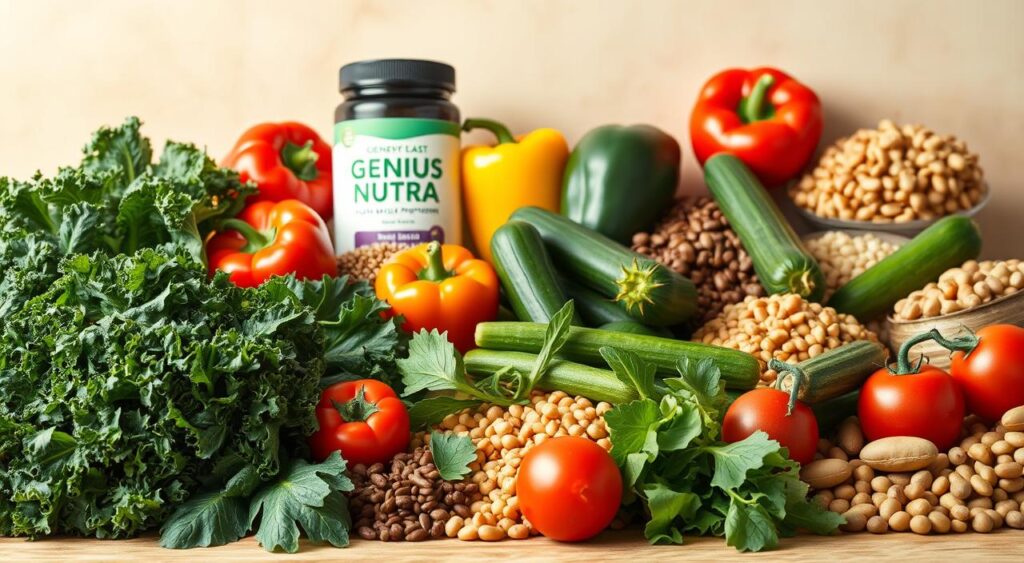
Meal Planning and Preparation Tips
Planning your meals is key to losing weight with a vegetarian diet. It’s important to eat balanced meals to stay healthy and manage your weight. Eating a variety of foods helps with weight loss, and preparing meals ahead of time can make it easier.
Creating Balanced Meals
To make balanced meals, mix different food groups. Try to include:
- Vegetables: Fill half your plate with leafy greens and colorful veggies.
- Whole grains: Choose foods like quinoa, brown rice, or whole-grain bread.
- Proteins: Use plant-based proteins like beans, lentils, or tofu.
- Healthy fats: Add avocados, nuts, or seeds to your meals.
Portion Control Strategies
Controlling your portions is important for losing weight. Here are some tips:
- Use smaller plates: This trick helps you eat the right amount.
- Listen to your hunger cues: Eat when you’re hungry and stop when you’re full.
- Pre-portion snacks: Having healthy snacks ready can stop you from eating too much.
Cooking Methods for Healthier Meals
The way you cook can make a big difference in your meal’s nutrition. Choose healthier cooking methods like:
- Steaming: It keeps nutrients and flavor in veggies.
- Grilling: It adds a smoky taste without extra fat.
- Baking: A good way to cook without using oils.
Overcoming Challenges
Starting a vegetarian diet can be tough. You might face challenges in social settings, cravings, and staying motivated. But, with the right strategies, you can overcome these hurdles and enjoy your journey.
Social Situations and Eating Out
Going out to eat can be tricky, as not all places have good vegetarian options. To solve this, plan ahead. Look up menus online or talk to the host about vegetarian dishes. Many restaurants are happy to make changes if they know ahead of time.
Cravings and Temptations
It’s normal to crave non-vegetarian foods sometimes. But, finding tasty vegetarian alternatives can help. Try new vegetarian recipes that taste like your favorite foods. This way, you can stay on track and have fun exploring new flavors.
Staying Motivated on a Vegetarian Diet
Keeping up with a vegetarian diet needs motivation. Join online groups or local meetups for support. Hearing from others who are on the same path can keep you excited. Plus, you can learn vegan weight loss tips that make your journey enjoyable.
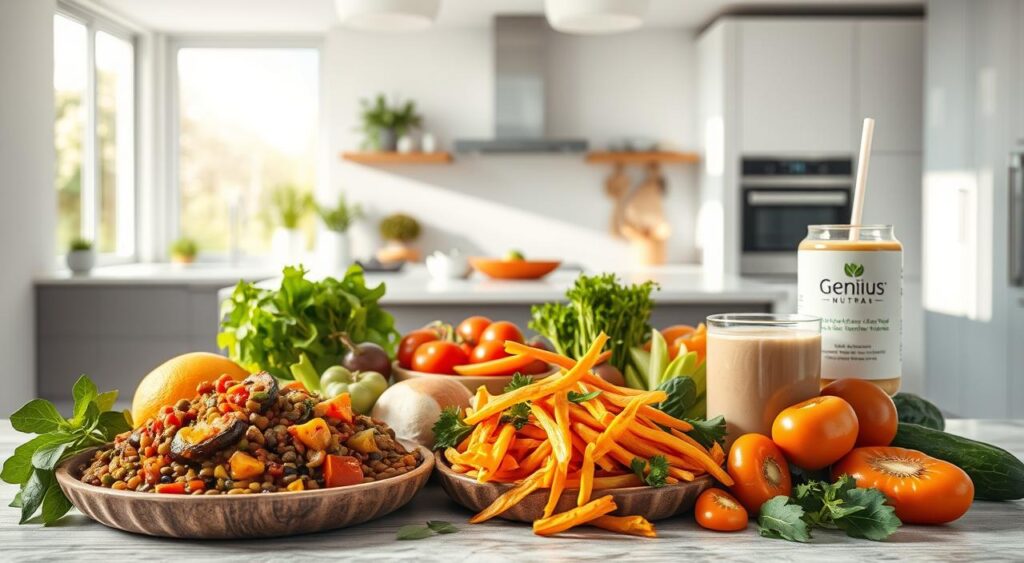
Success Stories and Testimonials
Success stories can be very inspiring for those thinking about a vegetarian lifestyle. Many people have seen big changes by trying vegetarian weight loss recipes. They not only lose weight but also feel better physically and mentally.
Real-life Transformations
People who have shared their stories talk about big changes in their health. Some have lost a lot of weight, while others feel more energetic and happier. These stories motivate others to try plant-based weight loss. They show how tasty and healthy vegetarian recipes can make it easy and fun.
Expert Insights
Nutritionists and health experts say community support is key to lasting success. Having friends who support you can help you stick to a vegetarian diet. They suggest using vegan weight loss tips from others in the community. This way, you can find support, share ideas, and learn new cooking skills that fit your diet.
Community Support
Online forums and local groups offer great encouragement when you face obstacles. By joining in, you can swap vegetarian weight loss recipes and tips. Connecting with others who have the same goals can create a supportive environment. It encourages you to keep going, leading to lasting changes in your lifestyle.
Research Findings
Recent studies have shown that a vegetarian diet is great for losing weight. It beats other diets like the Mediterranean and low-fat vegan diets. People who eat plants for weight loss see big benefits.
Recent Studies on Vegetarian Diets
People on vegetarian diets lose more weight than those on other diets. This leads to better health. Eating less AGEs, found in plants, helps your metabolism. You can read more about it here.
Weight Loss Comparisons with Other Diets
Vegetarian diets often lead to more weight loss than other diets. Vegan diets might lose more weight, but vegetarian diets are very healthy. People who stick to energy restriction lose more weight.
Long-term Effects on Health
Long-term studies show that vegetarian diets help with weight and health. They lower cholesterol and blood pressure. Vegan tips can make these benefits even better.
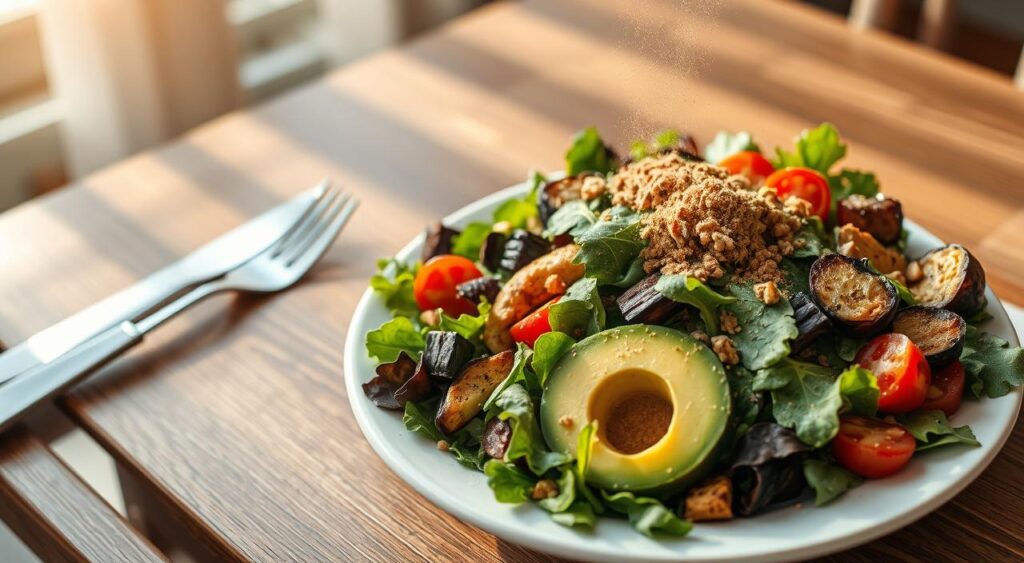
These studies prove that vegetarian diets help with weight loss and health. They show that eating more plants is a good choice for better health and well-being.
Expert Recommendations
Starting a vegetarian diet can be both rewarding and challenging. With the right guidance, you can reach your weight loss goals. It’s important to work with nutrition experts to make sure your diet is tailored to your needs.
Creating a diet plan that fits your lifestyle and health goals is key. This ensures you get the nutrients you need while losing weight.
Consulting with Nutritionists
Registered dietitians or nutritionists offer valuable advice. They help you choose vegetarian recipes that are both healthy and tasty. Their expertise can make your diet more enjoyable and beneficial for your health.
Tailoring Diets to Individual Needs
Every person is different, and diets should reflect that. A personalized vegetarian diet focuses on your specific needs. It might include meal plans and recipes that you like and fit your dietary restrictions.
Finding the right balance of nutrients is critical for losing weight and keeping it off. This includes proteins, vitamins, and minerals.
Combining Exercise with Diet
Combining a vegetarian diet with exercise boosts your weight loss efforts. Exercise improves your overall health and metabolism. Choose activities you enjoy, like yoga or swimming.
Regular exercise, along with healthy vegetarian recipes, forms a complete health plan.
| Component | Dietary Focus | Example Foods |
|---|---|---|
| Protein | Important for muscle maintenance | Quinoa, lentils, chickpeas |
| Vitamins | Boosts immune function | Leafy greens, bell peppers, berries |
| Fats | Essential for nutrient absorption | Nuts, avocados, olive oil |
| Fiber | Promotes satiety | Whole grains, fruits, vegetables |
Conclusion: Embracing a Vegetarian Lifestyle
Switching to a vegetarian diet can greatly improve your health and happiness. Studies show these diets lower the risk of chronic diseases. This can make your life better and help the planet for the future.
Starting as a vegetarian might feel tough, but it’s doable. Begin by adding more meatless meals to your diet. Try different plant-based foods to make it fun. A good meal plan can help you stay on track and find new favorite dishes.
To start your vegetarian path, plan your meals and buy fresh ingredients. There are many meal plans to help you. For more on the health perks of vegetarian diets, check out recent studies. Making this change will benefit you and the Earth.

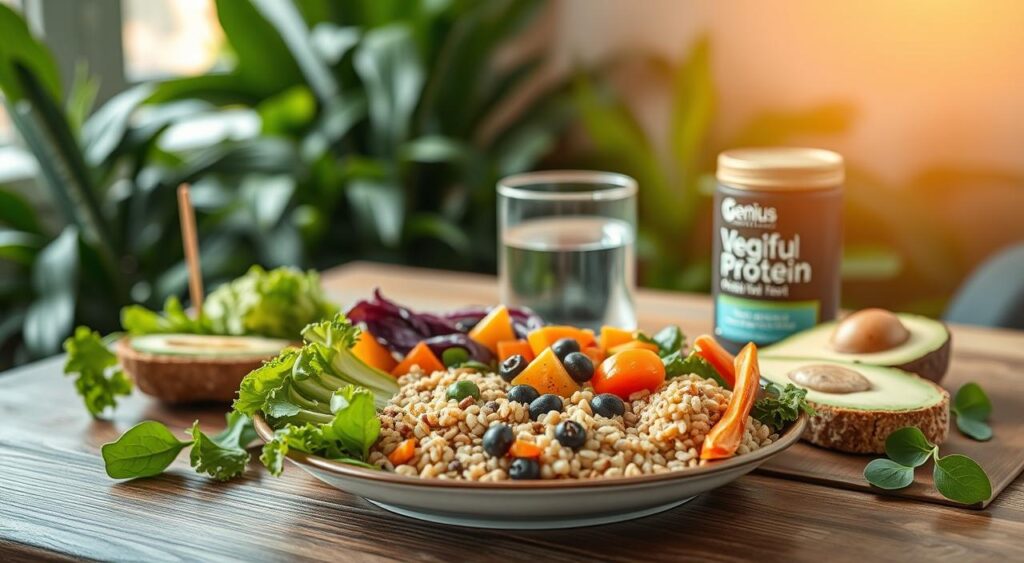
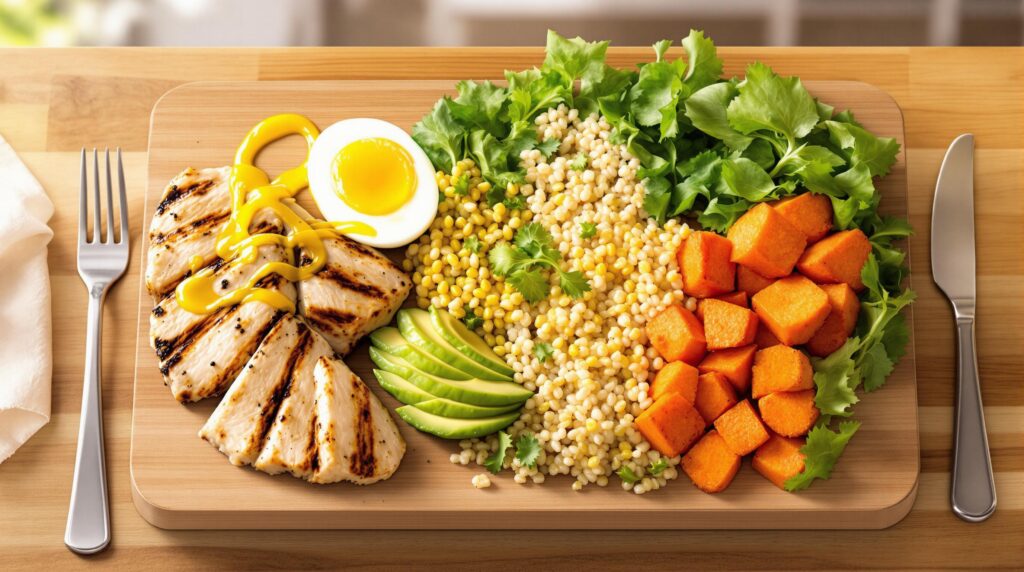

Pingback: Plant-Based Diet for Weight Loss: Why It Works Better Than You Think (Backed by Science)
Pingback: Flexitarian Diet Recipes: 15 Easy and Healthy Meals You’ll Love
Pingback: Vegetarian Diet for Weight Loss: Build a Lean Plate